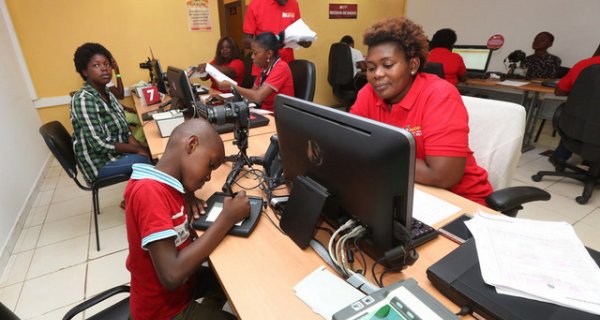The still nine million angolans who do not have a birth registration and the other seven million who do not yet have an identity card should make an appointment in advance to be attended at the Civil Registry offices.
This is the case of Teresa Zangue who, in August, made an appointment to deal with the civil registration of her 12-year-old son. The woman went this Tuesday to the Civil Registry office in the city of Kilamba, "after having made the appointment in August at the conservatory.
According to a Cipra publication on Facebook, Teresa Zangue wants to deal with the registration of her son who is "unable, for more than seven months, to receive the 6th grade certificate due to lack of documents".
The seller on the streets of the capital and living in Calemba 2, said she hopes that her son's registration will help him continue his studies and admitted the Program of Massification of Birth Registration and Attribution of Identity Card "is a door to solve the problem of the lack of documents of many families.
Program reveals positive results
According to Seretse Correia, spokesperson for the program, the lack of registration or identity card of about 16 million Angolans will change by 2022.
Since the program was launched in November of last year, "which has mobile brigades supported by fixed posts, is in the order of 16 percent from the point of view of the goal of birth registration and 12 to 13 percent in terms of issuing the ID, for the first time.
Despite the constraints imposed by covid-19, he considered the numbers positive and admitted that the "gradual increase in human capital and other resources that the program needs" came to help.
Seretse Correia also made it known that the month of September was the most productive, with 276 thousand birth registrations.
"As for the provinces, Luanda, the country's capital, is the region that has treated birth records and identity cards the most, followed by the provinces of Benguela, Kwanza Sul and Huambo," he said.
The goal for this year is "to reach two million citizens", and by last September the program had already covered 1,324,000 people.
As for identity cards, "the intention is to assign this document to one million citizens by 2020 and seven million by 2022. By last month, 740,234 people had their ID cards for the first time".
The responsible was even more positive when next year, considering that 2021 "will mark the enlargement of all means and the leverage of the program," which means that the numbers will double.
Still on the subject of statistics, he stressed that of the nine million Angolans without birth registration, more than 40 percent of those who asked for this document are adults.
Seretse Correia said that these numbers can be explained by the fact that before the program's entry, people have to postpone the request for this document because they have to pay for it.
"Late registration, including the BI process, could be around 20,000 kwanzas," the note said, adding that after the program's entry, for the first time citizens are "exempt from any fees.
Problems of mobilization and access
Despite the positive numbers, the spokesman complains about the problems of mobility and operation of computer equipment in the most remote communes and villages.
To try to combat the problems of access of mobile brigades to these communes, "the program will have the support of the Angolan Armed Forces, which will provide more robust vehicles, and also with greater collaboration of traditional authorities in mobilizing the population.
In addition, in those areas, as there is a lack of electricity and Internet to operate the computer systems was created a tool called "Shock of the Intelligent Book", which allows the record to be made in a book, without the need for energy or Internet.
"The book in reference, different from the others, already has, in the same sheet, a part with a birth certificate and another with the full copy. Through the combination of computer system and intelligent book, the costs of the program have been reduced", the publication adds.
For now, the State has already invested about 900 million kwanzas in movement and logistics, thus ensuring birth registration to nine million citizens.
"There is still a need to work towards the creation of a digitization center, since the intelligent book is registered in a manual system," says the spokesman, who explains that this center will allow the creation of a database with all the registrations made.
The Executive also plans to advance with new programs, such as "Born with the register". This program will be "executed in the maternity wards, in order to allow that as soon as the child is born it will have the birth registration".
He also made it known that this program already has more than 80 posts in the maternity wards of the country.







